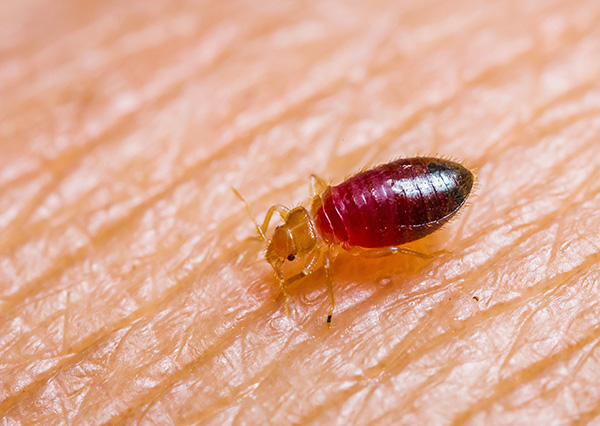
Next you will find out:
- What bugs eat and whether blood is the only source of food for them;
- How many bed bugs are able to live without blood and will they die if they leave the apartment for a few months;
- Do bugs bite domestic animals (cats, dogs) and why do chicken coops sometimes just infest these parasites;
- You will also find out whether bed bugs live in the wild and whether they can be accidentally picked up somewhere ...
Bites bed bugs - a kind of paradox of modern civilization. These parasites, pestering people still in stone caves, today easily adapt to the conditions of apartments with European-quality repair and continue to multiply successfully, despite all the achievements of the chemical industry that produces insecticides.
A huge number of apartments and houses in Russia, USA, UK, China, in developed and developing countries are simply teeming with bugs (the problem is especially acute in small hostels, through which a significant flow of people of middle and low incomes passes).
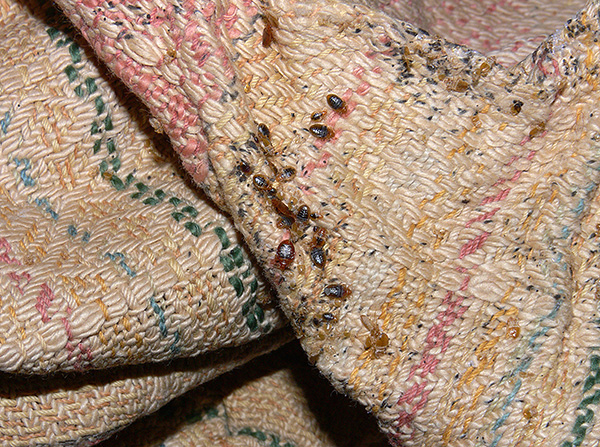
But why is it so difficult to fight these bloodsuckers? After all, it would seem that bed bugs feed on human blood, which means that it’s enough to leave the apartment for a couple of weeks and that’s it! Parasites will die, so to speak, starvation - simply for lack of a source of food.
However, practice shows that even if you leave a room that is infected with bugs for half a year, it is often not the entire population of parasites that die: the surviving individuals begin to bite people again and actively reproduce.
But how is that? What bugs fed on all these months, and do they really eat only human blood? Do they fall into anabiosis? Let's figure it out together ...
The diet and way of eating bedbug
The only bed bug food is really only the blood of mammals. Like other species of bugs (and there are more than 40,000 species in nature), the residential parasites have their jaws turned into an elongated proboscis,which the insect pierces the skin of a person, gets to the blood vessel and sucks blood to saturation.
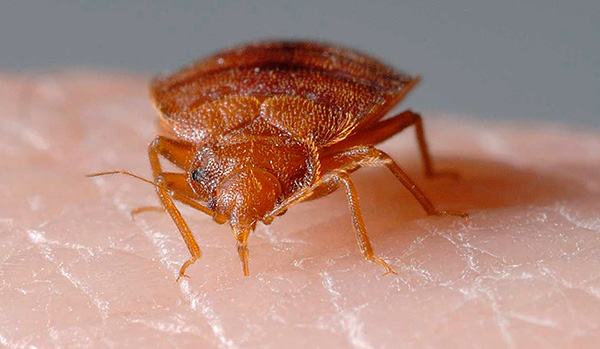
It is interesting
Generally speaking, what bedbugs eat is well seen through the translucent walls of their young larvae: their bodies appear to be scarlet from drunk blood (see the examples in the photos below).
If you catch several insects of different degrees of saturation, it is easy to see that hungry adults have a flat brown body, and hungry larvae are light brown or light yellow. When saturated, the parasites become dark scarlet, their bodies swelling, filled with fresh blood.
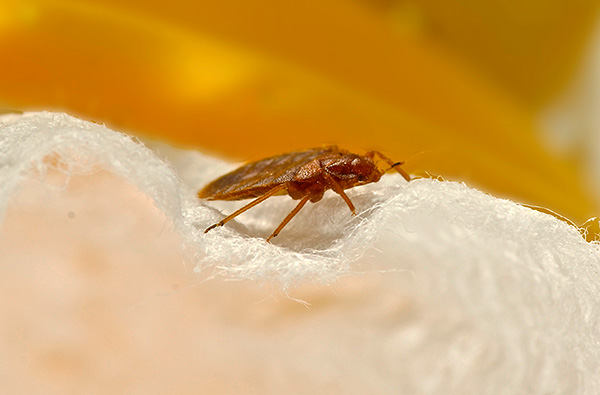
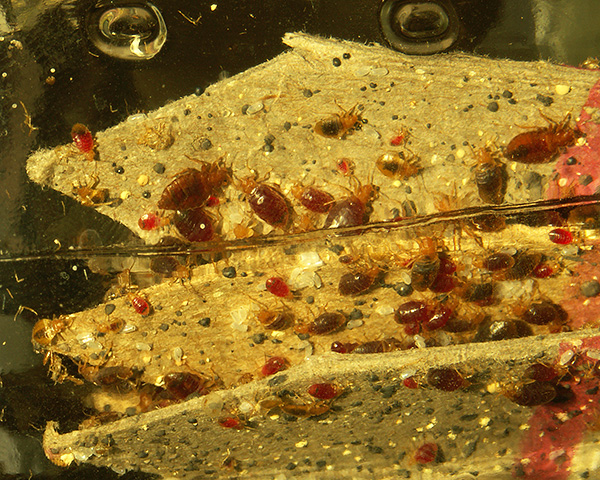
At the same time in their "dining habits" bloodsucking bugs are quite original. So, for example, they are not satisfied with sucking blood from only one wound in one feeding. In most cases, they make several punctures along the same blood vessel (or even without being tied to it).
Due to this feature, bedbug bites stand out noticeably among the bites of other human parasites: their marks are usually connected in chains with an interval of 1-2 centimeters. Some kind of paths are formed from bites (so if you found such paths on your body,you should not attribute their allergies, as it is often done by unprepared people when they first “meet” with bedbugs).
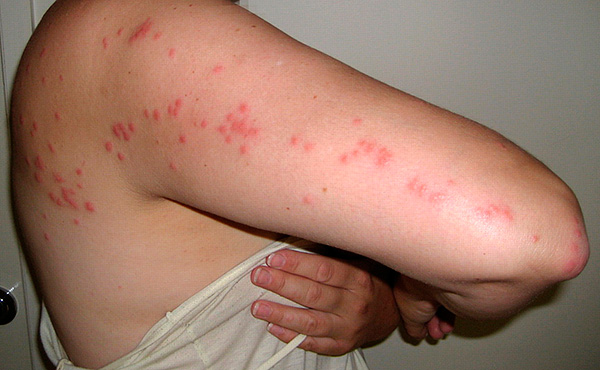
In addition, bed bugs bite only for hairless parts of the body. Because of its wide flat abdomen, these blood-sucking parasites find it difficult to break through the hairline to human skin, so they almost never bite into the head and groin area.
On a note
Common places for bedbug bites are buttocks, thighs, hips, abdomen, back, arms, neck, and face. If a person sleeps in his underwear, the parasites do not climb under him and bite only the exposed parts of the body.
Bedbug - bloodsucker night. He prefers to attack his victim in the interval from two o'clock in the morning to five in the morning, when a person sleeps most soundly. The bites are practically painless, but the saliva secreted by the parasite, some time after getting into the skin tissue, begins to cause itching. Accordingly, it is usually possible to catch the parasite directly at the moment of a bite only with a light sleep or with an accidental awakening at night.
A characteristic feature is that after nightly feeding on bloodsuckers, small blood stains often remain on the white sheet.
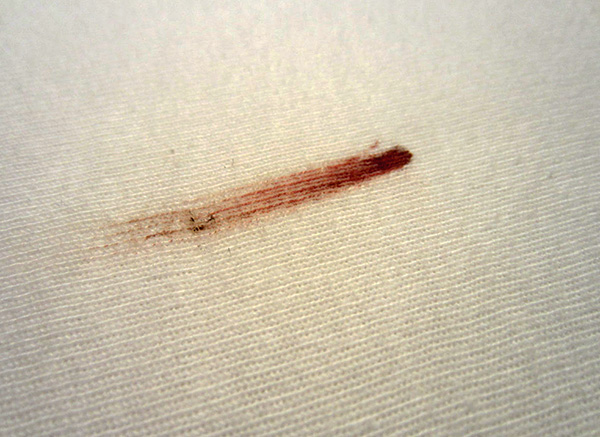
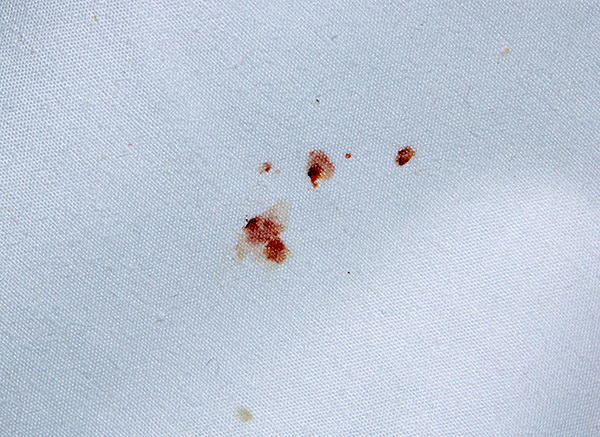
It is interesting
Other species of bugs living in nature, can pierce the stems and fruits of plants, sucking their juices. Some attack arthropods, and large bugs - even fish and frogs, sucking up almost all the insides of their victims. However, most bugs are vegetarians, and they do not attack humans.
Bedbugs today live almost exclusively in or near human habitation, and in nature they are found only in very specific places - for example, in bat nests.
How long can bugs live without blood?
In general, we can say that bugs live without food for a long time. One or two months of hunger strike for them are virtually harmless and do not even require falling into a stupor and any inhibition of physiological processes.
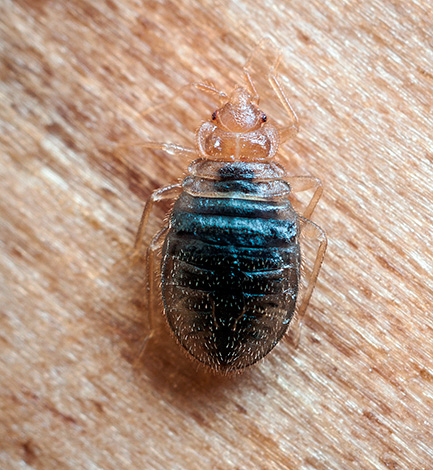
If the source of food near the bloodsucker bug is not too long, then it can fall into a state of anabiosis, in which the biochemical processes in his body are slowed down. In such a kind of hibernation, the insect can spend up to a year, while remaining alive.
There are cases when tenants of apartments wrapped mattresses infected with bugs with plastic wrap in the hope that the parasites will have nothing to eat and they will die without blood in a couple of months.However, even after six months of keeping the mattress wrapped in a film, the bugs in it were still alive.
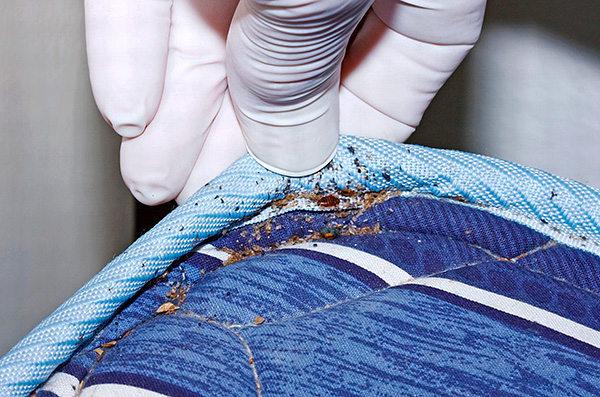
On a note
In comfortable living conditions, the life expectancy of a bed bug is about 12-14 months. If hibernation is present in the life cycle, then this period is extended.
It is useful to consider the following nuances:
- adult bugs live without food longer than the larvae;
- without fresh blood, the female cannot lay off the next batch of eggs, therefore the reproduction of parasites practically stops;
- without obtaining blood, the larva is not able to shed, its development slows down dramatically.
It is interesting
Normally, the bed bug eats every 5-6 days, and in the intervals between it digests the blood drunk. Larvae can feed more often, but with each feeding they make fewer bites and suck less blood than an adult.
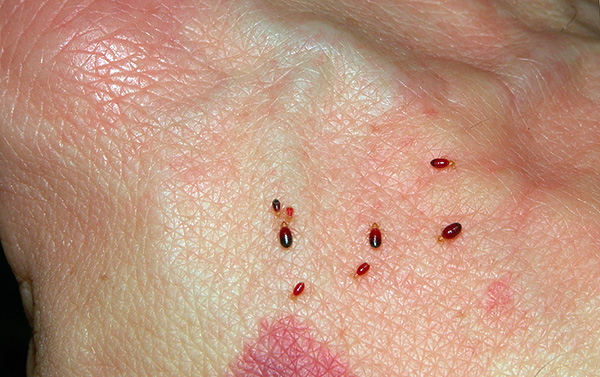
Even if there are several dozen bedbugs living in the house, a person may not pay attention to their bites for a long time. Often, the parasites bite only someone in the family, almost without touching the other tenants.
Feedback:
“We recently rented an apartment, without furniture. All new furniture bought, made repairs. A month later, she began to find traces of bites on the child.At first I thought it was an allergy, because my husband and I had nothing at all. Then she found bedbugs right in the nursery bed. Where did they come from? The apartment was empty for a whole year, no one lived in it. The neighbors look at me like they are crazy, they say that everything is clean ... ”
Marina, Moscow
Can bedbugs suck the blood of pets?
It is believed that bed bugs do not bite domestic animals: cats, dogs, as well as guinea pigs, rats, etc. However, in reality it is not so simple.
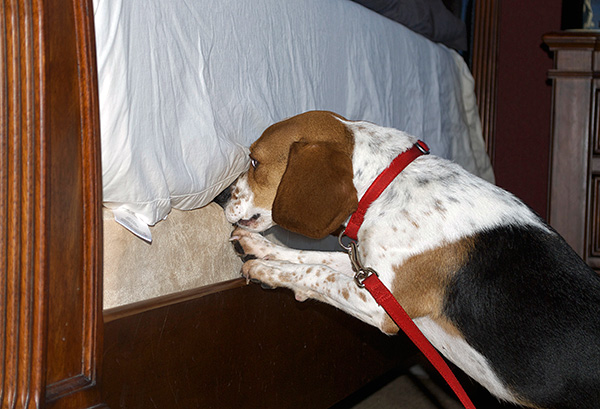
In certain situations (critical for survival, that is, when there is no other food at all), bloodsucking bugs can bite domestic animals. It is important that for mammals all potential mammals and birds are potential victims: parasites can, if necessary, feed on the blood of pigeons in the attics and the blood of rats in the basements.
However, it is much more difficult to feed even on rats to bloodsuckers than on humans - the presence of a dense coat of wool creates difficulties for access to the skin surface. There is no need to talk about dogs and cats here, because of the difficulties with access to the skin, bugs practically do not touch these animals.
Even if people do not live in the apartment for a long time, but there are domestic animals, the parasites gradually leave the premises, if there is such an opportunity (usually through the cracks and ventilation ducts - to neighboring apartments).
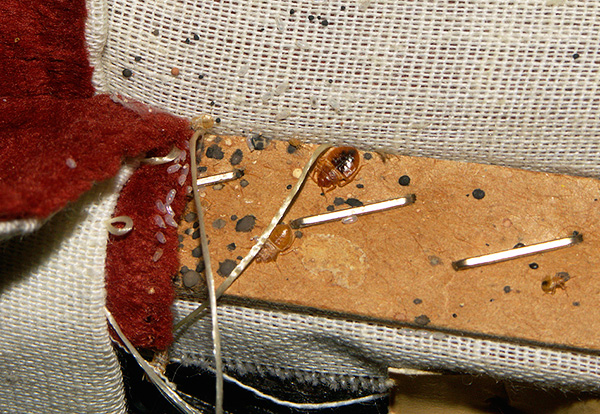
"Tidbits" for bedbugs - domestic chickens, with their thin skin and areas without feathers in the eye and beak. That is why chicken coops are infected very often: bed bugs feed on the blood of birds with the same pleasure as human blood. Often in rural areas it is necessary to poison coop from bedbugs even more often than residential houses - bedbugs breed here swiftly.
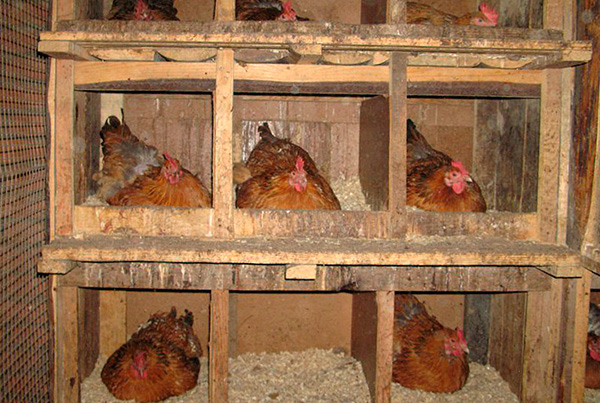
Bed bugs and their diet in nature
In general, the number of bed bugs that live in nature today is much less than the total number of their apartment populations.
Sometimes wild populations of bed bugs are found in caves in which the temperature is maintained at about the same year round: parasites feed on the blood of bats. In the case of the wings, there is no fur on the wings, and under the thin skin there are easily accessible blood vessels, which provide bugs with almost ideal conditions for feeding.
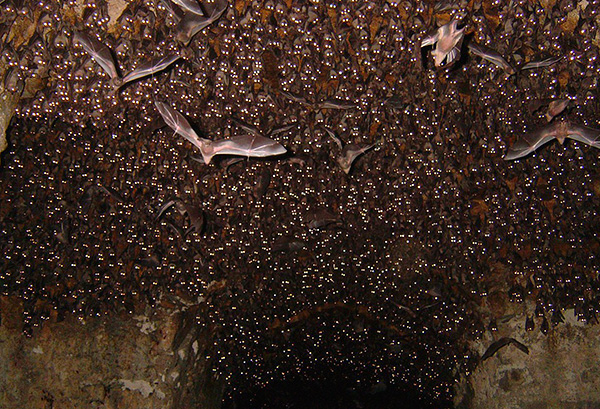
In some places in nature, bugs constantly live in the holes of rodents and the nests of colonial birds. But it can be said fragments of their main population.
It is interesting
Scientists believe that it was in the caves in prehistoric times that the bugs first tasted human blood and switched to feeding on it. Since then, these parasites have become constant companions of man, and their populations in the caves are considered to be a kind of preservatives.
Today, in addition to bed bugs, some species of predator bugs parasitize bats. In the video below you can see how this meal takes place.
What you need to know about bed bugs modern man
Bed bug bug larva sucks blood, significantly increasing in size

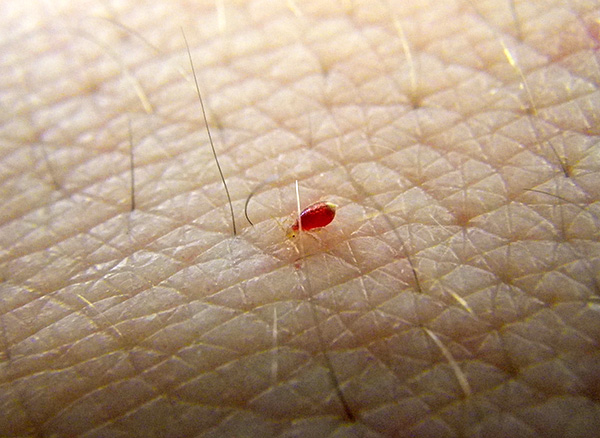
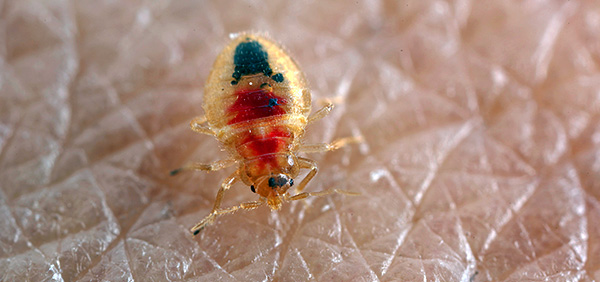
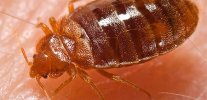
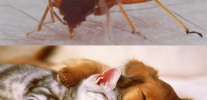
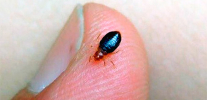
Death to bedbugs!
I live in an empty apartment and I have 10 bugs for 10 years! I lay down on the floor and draw a chalk circle around the bugs around me. So sleep.
And what if you lie down on the sofa and draw chalk around the sofa?
Tell me please! Summer. Brought someone else's ottoman to the country. Stood on the street for 3 days. To the house about 10 meters. Bugs and cockroaches were found in it. The ottoman was burned, but what if some of the living creatures managed to escape? Can she crawl all over the house? How to be?
Arrange the spacing owners ottoman. Of course, the most active part of the bugs climbed to look for food sources in the house. 10 meters is no problem for them. Call disinfectors to handle your cottage before it is too late.
Julia, the most trouble for bedbugs is frosty air or ordinary boiling water. This is death for them. In addition, these creatures are deterred by the smell of vinegar and kerosene.
We have bugs, terrible, whole days at home. Scary, phew!
And I alone with a bitch under the door of her apartment carried about half a thousand pieces in a year, so that it’s not me who suffered.
So bitch and need! Right!
Does anyone know if they sell a syringe from these creatures?
Is there a real cure for them?
In Uncle Vanya's room, where there are dressers and closets ... They lived in a leather sofa, angry yellow CLOTHES!
They were burned with gases, smeared with kerosene, sprinkled with powder, poured boiling water.
Nothing helped, there was very little confusion ...
In short, Uncle Vanya turned out to be smarter than bedbugs and just sold the sofa. Recently to kill bedbugs invited a person from the official organization. Oh how. Stripped 6700 rubles for the treatment of a three-room apartment. Zafigachili hot fog and gave a guarantee for 6 months. But the hot fog, like the cold one, turned out to be like a hoax ...
He just bought everything and sprayed it in the old manner. It all cost 3000 rubles.People! You are stuck on the headstock of businessmen from the sanitary epidemiological stations and other services. Fortunately, the licensing of this business ended in 2007. Cheerful students work as disinsectors and send huge money for hot mist.
And what drug was sprayed?
I have a bag with bedbugs in the attic for 3 years. And the frost there in the winter, and the heat in the summer. How to make sure that they are all dead?
Well, in the cold just dead)
My friend also slept on the floor (on the mattress) because of these "creatures." Only around the mattress glued with tape long flexible ten (t above 50 degrees). And the sofa had to be thrown out ... By the way, they called the brigade, poisoned it with a “cold mist” by some simple means, however, in high concentration, 5 times higher than the norm, sort of. Month 4-5 came across oh-oh-ry sluggish, dried up specimens ... Probably, it was necessary to repeat the treatment (perhaps with another, more new means). About a year later, the “activity” began again; there was a “nest” at the outlet from the neighbors. Yes, and the sofa was covered somewhere in the left office.
We also suffered this attack! Stripped upholstery with a sofa (sleep on chipboard with foam rubber), rattled off raptor.Were at the cottage for 2 months, and all this time we were waiting for starving creatures. The other day the whole room in the vinegar was bathed, including the sofa. Cheap came - 10 liters for 160 rubles. It seems to be quiet!
From the neighbors after their euro-repair bugs moved to us. Called disinfectants "Clean City" - it turned out, as always, cheating. They tore off the headstock, began to plant for the headstock, but we didn’t fall for it, paid only the agreed amount. After processing on the same day, the bugs began to brazenly run. We will fight on our own. Do not trust disinfectors, especially the firm "Clean City".
It is necessary to sprinkle into bed, in the cracks and everywhere turmeric (powder). After that, vacuum and hot steam to walk, having processed all the cracks - wherever bugs can be. There is no information about this, because it is unprofitable for companies that persecute.
See that there is no allergy. Only you need to fill in everywhere, always in plastic sockets, switches, in wooden beds, in the cracks in the floorboard. Sprinkle the mattress completely with powder, and sprinkle it everywhere in the upholstered furniture. Turmeric paralyzes bugs, they choke and die.
I was helped by a dry concentrate "From bugs."